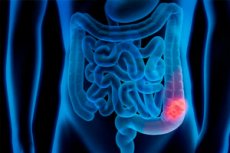Abdominal pain and bloody stools are important signs of early bowel cancer
Sist anmeldt: 14.06.2024

Alt iLive-innhold blir gjennomgått med medisin eller faktisk kontrollert for å sikre så mye faktuell nøyaktighet som mulig.
Vi har strenge retningslinjer for innkjøp og kun kobling til anerkjente medieområder, akademiske forskningsinstitusjoner og, når det er mulig, medisinsk peer-evaluerte studier. Merk at tallene i parenteser ([1], [2], etc.) er klikkbare koblinger til disse studiene.
Hvis du føler at noe av innholdet vårt er unøyaktig, utdatert eller ellers tvilsomt, velg det og trykk Ctrl + Enter.

In a recent review published in JAMA Network Open, a team of researchers discussed the symptoms and signs commonly encountered in patients with early colorectal cancer, how these signs relate to disease risk, and variations in time from the onset of first symptoms to diagnosis.
Recent trends show that while the incidence of colorectal cancer among older adults is declining, the incidence of early colorectal cancer, diagnosed in people under 50 years of age, is rapidly increasing. Research suggests that the incidence of early colorectal cancer could increase by 140% by 2030.
These alarming predictions have led to updated guidelines for colorectal cancer screening, starting screening at age 45 for those at moderate risk of the disease. Moreover, early detection of the disease is a priority, as patient survival is significantly higher with early diagnosis and treatment.
Delays in diagnosis can be caused by a variety of reasons, such as doctors' lack of knowledge about symptoms, patients underestimating the severity of symptoms, or failure to recognize common signs of illness. Therefore, it is important to better understand the common symptoms and signs of early colorectal cancer.
Description of the study
The purpose of this study was to answer three questions through a systematic review and meta-analysis of studies on early colorectal cancer. First, to identify the most common symptoms and signs in patients with early colorectal cancer. Second, understand the relationship between these symptoms and the risk of early colorectal cancer. Third, examine the time interval between the first onset of symptoms and diagnosis.
Studies that reported any symptoms or signs of non-hereditary colorectal cancer in people under 50 years of age were included in the review. Studies with fewer than 15 patients or those where the majority of patients were under 18 years of age were excluded.
Information was extracted from the studies on the proportion of patients with early colorectal cancer who had each symptom or sign, the estimated risk of disease based on these symptoms, and data on the time elapsed from the onset of symptoms to diagnosis.
Research results
The results showed that more than 50% of patients with early colorectal cancer complained of abdominal pain and hematochezia (blood in the stool), and 25% of patients experienced changes in bowel habits.
Hematochezia was associated with a 5- to 54-fold increase in the risk of colorectal cancer, and abdominal pain with a 1.3- to 6-fold increase in the risk of developing the disease. In addition, there was often a delay of 4-6 months between the onset of symptoms and diagnosis.
Some studies indicate that younger people may have a longer time to diagnosis than middle-aged people. However, other studies suggest that later stages of the disease in younger patients may be due to other genetic and biological factors rather than delays in diagnosis.
Conclusion
The study's findings highlight the need for physicians to consider early colorectal cancer in the differential diagnosis if patients present with signs such as hematochezia or abdominal pain. Additional tests such as colonoscopy, ultrasound, and computed tomography should be considered to confirm or rule out early colorectal cancer.
Overall, the study results show that symptoms such as abdominal pain and hematochezia occur in more than 50% of patients with early colorectal cancer, and a quarter of them experience changes in bowel habits. If these symptoms are present, doctors should perform additional tests to confirm or rule out early colorectal cancer and avoid further delays in diagnosis.
